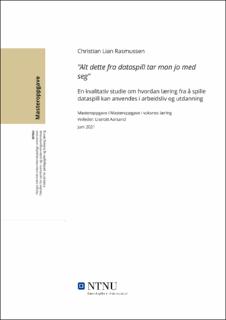| dc.contributor.advisor | Aarsand, Liselott | |
| dc.contributor.author | Rasmussen, Lian, Christian | |
| dc.date.accessioned | 2021-09-28T17:42:31Z | |
| dc.date.available | 2021-09-28T17:42:31Z | |
| dc.date.issued | 2021 | |
| dc.identifier | no.ntnu:inspera:79284355:10040773 | |
| dc.identifier.uri | https://hdl.handle.net/11250/2784787 | |
| dc.description.abstract | Livslang læring er et begrep som viser til at alle inntrykk og situasjoner man møter bidrar til en kontinuerlig læringsprosess gjennom hele livsløpet. Gjennom økt interesse for dataspill, også kalt videospill, som en populærkulturell aktivitet har erfaring fra dataspill blitt et dagsaktuelt tema, hvor noen organisasjoner og aktører hevder at dette kan ha overføringsverdi til arbeidslivet. Studien undersøker i denne forbindelse hva voksne kan lære av å spille dataspill, med bakgrunn i følgende problemstilling:
På hvilke måter opplever voksne læring fra å spille dataspill, og hvordan kan dette anvendes i arbeidsliv og utdanning?
Denne oppgaven tar utgangspunkt i et sosiokulturelt perspektiv, som legger vekt på samspillet mellom mennesker, hvor kunnskap blir formet og konstruert gjennom samarbeid og interaksjon. For å belyse dette nærmere inkluderes teorier omkring uformell læring, situert læring, flow-modellen, og transfer av læring. For å se nærmere på informanters egne tanker og meninger er det benyttet et kvalitativ forskningsdesign i form av seks semistrukturerte intervjuer som metode for datainnsamling. Utvalget besto av voksne kvinner og menn i en alder mellom 20 og 35 år med erfaring av å spille dataspill. Det empiriske datamaterialet ble videre analysert i en stegvis-deduktiv-induktiv metode. Kapittelet omkring presentasjon av resultater ble delt inn i seks hovedtemaer som er: 1. Skolerelaterte fagkunnskaper, 2. Lederskap, 3. Vennskap og relasjon, 4. Drivkraft, konkurranse og mestring, 5. Taktikk, samhandling og fellesskap, og 6. Refleksjon.
Resultatene tyder på at dataspill kan være en arena som inneholder gode muligheter for læring. Informantene har forskjellige meninger omkring hvilket læringsutbytte som anses som sentral, da de vektlegger det de selv tror er mest essensiell for egen utøving i utdanning og arbeidsliv. De erfarer læring av å spille dataspill i hverdagen og kan bli bevisst på kunnskap i møte med nye situasjoner og kontekster, noe som kan virke utfordrende for enkelte da samfunnsdebatten omkring dataspill har vært splittet i form av at noen mener det er bortkastet tid og avhengighetsskapende, hvor andre mener det kan inneholde gode læringsmuligheter, og medbringe gylden kompetanse i møte med arbeidslivet. Videre i resultatene kan det antydes at interesse og deltakelse innad i dataspill er noe som fremmer læring. Siden dataspill har vært en del av informantenes hverdag over en lang tid, synes det gjennom masteroppgaven at læring fra å spille dataspill har medvirket i å forme personene til den de er i dag. | |
| dc.description.abstract | Lifelong learning is a term that indicates that every impression and situation one encounters throughout the course of life contribute to a continuous learning process. Through increased interest in computer games, also called video games, as a popular cultural activity, experience from computer games has become a current topic, where organizations and other actors claim that it can have transfer value to working life. Thus, this study examines what adults can learn from playing computer games, based on the following research question:
In what ways experiences adults learning from playing computer games, and how can this be applied in working life and education?
The thesis is based on a socio-cultural perspective, emphasizing interactions between people, and the belief that knowledge is shaped and constructed through such interactions and collaboration. To gain a more comprehensive understanding of this matter, theories of informal learning, situated learning, the flow model, and transfer of learning are included. A qualitative research design with six semi-structured interviews has been employed to collect the empirical data and take a closer look at the informants’ own thoughts and opinions. The sample consists of adult women and men between the ages of 20 and 35 with experience of playing computer games. The empirical data material was further analyzed in a step-by-step deductive-inductive method. The chapter with the presentation of results was categorized into six main themes: 1. School-related knowledge, 2. Leadership, 3. Friendship and relations, 4. Drive, competition and mastery, 5. Tactics, interaction and community, and 6. Reflection.
The results suggest that computer games can be an arena containing good opportunities for learning. The informants have different opinions about the importance of different learning outcomes, as they emphasize what they believe is essential for their own practice in education and working life. They experience learning from playing computer games in everyday life and can become aware of knowledge in the face of new situations and contexts. Subsequently, this can be experienced as challenging for some as the societal debate about computer games has been divided between some arguing it is addictive and a waste of time, while others believe it can contain good learning opportunities, and contribute to competence in the face of working life. Furthermore, the results suggest that interest and participation in computer games is something that promotes learning. Since computer games have been a part of the informants’ everyday lives for a longer period of time, it seems through the master’s thesis that learning from playing computer games has helped shape the people into who they are today. | |
| dc.language | nob | |
| dc.publisher | NTNU | |
| dc.title | "Alt dette fra dataspill tar man jo med seg"
En kvalitativ studie om hvordan læring fra å spille dataspill kan brukes i arbeidsliv og utdanning | |
| dc.type | Master thesis | |
